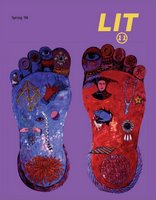He was all up in the truthiness. Oh yes.
Surely they'll have clips on tomorrow night's show.
Or you could watch it now.
What's at Frank's?
from American Tatts by Linh Dinh (Chax, 2005)
A fake Calder floats over Sheila's head,
Who really should be called Sheila-na-gig,
Because she's all vulva and all suds,
And because she's well-tipped each evening.
On one side of the horseshoe bar is Gummy Christ,
Well-known for his toothy grin, sucking
On a yellow Corona between throws at cricket.
On the other side of the horseshoe bar is Skinny Dave,
Who's all coked-out and skull-plugged
To a quiet walkman playing Nine Inch Nails.
A large trust fund has allowed Dave to be fulfilled
By volume after volume of the fattest sci-fi
He reads zealously while swiveled on his stool.
Dave prefers the ladies' to the mens' room,
Because you can be locked inside, although
The full-bladdered matrons are none-too-happy
Queuing outside waiting for Skinny Dave
To finish powdering his fuckin nose.
"Full pelvic undulation will help to dissolve
All neurotic personal armor," some one has written
With a Magic Marker over the broken sink.

LIT 11 contains poetry and prose by Samuel Amadon * Anne Boyer * Michael Burkard * Heather Christle * Adam Clay * Bruce Covey * Lisa Croneberg * Katie Degentesh * Stephen Dixon * Stephen Dunn * Russell Edson * Jim Goar * Nada Gordon * Rae Gouirand * Kate Greenstreet * Christine Grillo * James Grinwis * Joshua Harmon * Jennifer Michael Hecht * Nathan Hoks * Nicolas Hundley * Lisa Jarnot * Brian Kalkbrenner * Amy King * Caroline Knox * Justin Lacour * Ben Lerner * Timothy Liu * Michael Loughran * David McAleavey * Anthony McCann * Marc McKee * Corey Mead * Peter Mishler * Ange Mlinko * Dennis Must * Philip Nikolayev * D. Nurkse * Geoffrey O'Brien * Jacquelyn Pope * Jerome Rothenberg * Kevin Sampsell * Greg Sanders * Cindy Savett * Morgan Lucas Schuldt * Andrew Seguin * Spencer Selby * David Silverstein * Rick Snyder * Chris Stroffolino * Nova Ren Suma * Rosmarie Waldrop * Alli Warren * Elisabeth Whitehead * David Wilson * Xue Di * Art by Jane Hammond
MY DEAR BANK,
we tour the caviar
mirage
until it's hacked.
Squamous greenhouse
breathing debt.
Your aggregate
gapes.
Socratic dealership hats:
strictly invisible.
Under partition circumstance,
tom-tom furnace.
Arctic fast--
involuntary.
Hard-up night
throws me a tarantula
slipcover consolation.
Squamous greenhouse
breathing debt.
Your aggregate
gapes.
Somebody you thought was dead is alive.
Somebody you thought was alive is dead.
Sometimes it's a happy surprise.
"Kenneth Koch said to me that he was jealous even of John's dreams."
"Howard Nemerov asked me once 'But can you memorize his poems?' After walking halfway around the lake, I got it."
[& after a half-dozen other similar miniature anecdotes:]
"Yes, I've memorized pretty much everthing John's ever said to me. But I was asked not to tell anecdotes tonight, so I won't."
THE COUNCIL OF THE CITY OF NEW YORK
OFFICE OF COMMUNICATIONS
CITY HALL
NEW YORK, NY 10007
Contact: Anthony Hogrebe
***MEDIA ADVISORY***
City Hall * At tomorrow's Stated Council Meeting, Speaker Christine C. Quinn will be honoring John Ashbery, one of America's most distinguished poets, with an official proclamation. The proclamation recognizes Ashbery for his literary and cultural contributions, and designates April 7th as "John Ashbery Day" in New York City.
Ashbery has won nearly every major American award for his poetry, including the Pulitzer, the Bollingen, and the National Book Award. A New York City resident for four decades, Ashbery is one of the original members of the celebrated New York school of poets, which flourished as a major avant-garde movement in the 1950s and '60s and which has many adherents and students today.
He has published more than 20 collections, beginning in 1953 with Turandot and Other Poems, and his work has been translated into more than twenty languages. He currently serves as the Charles P. Stevenson, Jr. Professor of Languages and Literature at Bard College.
WHERE: Council Chambers, City Hall
WHEN: Wednesday, April 5, 2006
TIME: 1:00 PM